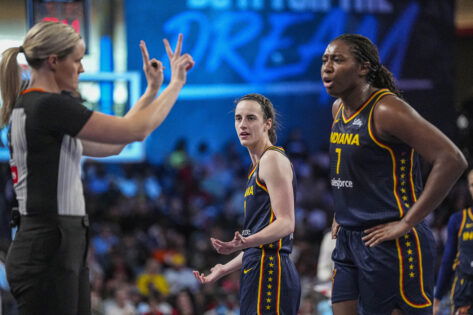

The world of the WNBA is currently ablaze with scrutiny surrounding its officiating, prompting widespread criticism from analysts and fans alike. A recent focal point of this controversy is the perceived disparity in how games involving the Indiana Fever, particularly with star rookie Caitlin Clark, are being officiated, leading some to label the situation a "laughing stock."
Several incidents have fueled this firestorm. In a recent game against the New York Liberty, Fever coach Stephanie White lambasted the referees, deeming their officiating "egregious" after a controversial no-call on a play involving Clark in the game's final moments. White wasn't alone in her assessment; Clark herself and teammate Aliyah Boston have expressed their frustrations. The Fever, in their last three games, have endured a significant free-throw deficit compared to their opponents, a fact White pointed out as particularly concerning given the team's aggressive drives to the basket.
The issue extends beyond just one team or player. Analyst Rachel DeMita has voiced concerns over the inconsistencies in officiating across the league, particularly highlighting the frequent calls on screeners while seemingly ignoring illegal screens. This sentiment resonates with many who feel the league's focus is misplaced, prioritizing minor infractions over more impactful plays. DeMita mentioned on her podcast that she finds it odd that the league seems to emphasize illegal screens above all else.
Brittney Griner, a star for the Atlanta Dream, didn't mince words, demanding referees "be f---ing better" during a halftime interview. This outburst underscores the growing discontent among players who feel their concerns are not being adequately addressed.
The WNBA does have a system in place for teams to submit grievances regarding officiating, but Stephanie White, among others, has openly questioned its effectiveness. This lack of faith in the existing mechanism further exacerbates the problem, leaving teams feeling unheard and without recourse.
Several factors contribute to the perception of poor officiating. Some suggest that the league's rapid growth, fueled by the arrival of stars like Clark, has put a strain on the existing pool of referees. Others point to a potential bias, whether conscious or unconscious, against certain players or teams. There is also the argument that WNBA referees who perform well are often promoted to the NBA, which depletes the WNBA of experienced officials.
The consequences of this officiating crisis are far-reaching. Inconsistent and questionable calls can alter the outcome of games, erode the trust of fans, and overshadow the on-court product. For a league on the cusp of a potential breakthrough, these controversies threaten to derail its progress. As one analyst put it, "when your league's biggest star consistently faces physical play without getting corresponding foul calls, it creates a perception problem that extends far beyond individual games."
The WNBA faces mounting pressure to address these concerns head-on. Whether through enhanced training for referees, a more transparent review process, or stricter accountability measures, the league must take decisive action to restore confidence in its officiating and ensure a fair and competitive playing field for all teams. The future trajectory of the WNBA may very well depend on it.